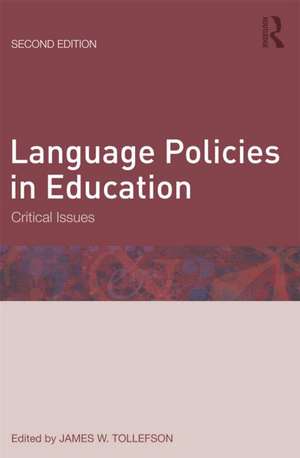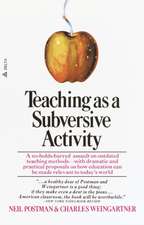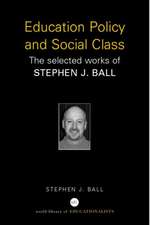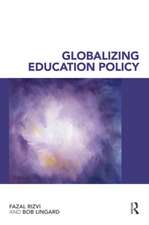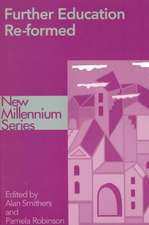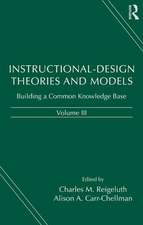Language Policies in Education: Critical Issues
Editat de James W. Tollefsonen Limba Engleză Paperback – 25 aug 2012
| Toate formatele și edițiile | Preț | Express |
|---|---|---|
| Paperback (1) | 471.63 lei 6-8 săpt. | |
| Taylor & Francis – 25 aug 2012 | 471.63 lei 6-8 săpt. | |
| Hardback (1) | 1120.20 lei 6-8 săpt. | |
| Taylor & Francis – 24 aug 2012 | 1120.20 lei 6-8 săpt. |
Preț: 471.63 lei
Preț vechi: 554.86 lei
-15% Nou
Puncte Express: 707
Preț estimativ în valută:
90.25€ • 94.54$ • 74.79£
90.25€ • 94.54$ • 74.79£
Carte tipărită la comandă
Livrare economică 08-22 aprilie
Preluare comenzi: 021 569.72.76
Specificații
ISBN-13: 9780415894593
ISBN-10: 041589459X
Pagini: 328
Dimensiuni: 152 x 229 x 15 mm
Greutate: 0.44 kg
Ediția:Revised
Editura: Taylor & Francis
Colecția Routledge
Locul publicării:Oxford, United Kingdom
ISBN-10: 041589459X
Pagini: 328
Dimensiuni: 152 x 229 x 15 mm
Greutate: 0.44 kg
Ediția:Revised
Editura: Taylor & Francis
Colecția Routledge
Locul publicării:Oxford, United Kingdom
Cuprins
Preface
Part I: Language Policy in Education
11. Rwanda Switches to English: Conflict, Identity and Language-in-Education Policy
13. Language Planning and Cultural Continuance in Native America
Author Index
Subject Index
Part I: Language Policy in Education
- Critical Issues in Language Policy in Education
James W. Tollefson
- Language Policy in a Time of Crisis and Transformation
James W. Tollefson
- Multiple Actors and Arenas in Evolving Language Policies
Mary McGroarty
Part II: Competing Agendas - A Brief History and Assessment of Language Rights in the
United States
Terrence G. Wiley - Righting Language Wrongs in a Plurilingual Context: Language
Policy and Practice in Nicaragua’s Caribbean Coast Region
Jane Freeland - Positioning the Language Policy Arbiter: Governmentality and
Footing in the School District of Philadelphia
David Cassels Johnson
Part III: Indigenous Languages in Postcolonial Education - Language and Education in Kenya: Between the Colonial Legacy
and the New Constitutional Order
Alamin Mazrui - Language-in-Education Policy and Planning in Africa’s
Monolingual Kingdoms of Lesotho and Swaziland
Nkonko M. Kamwangamalu
Part IV: Language and Global Capitalism - The Japanisation of English Language Education: Promotion of the
National Language within Foreign Language Policy10. India’s Economic Restructuring with English: Benefits Versus
Kayoko Hashimoto
CostsPart V: Language and Social Conflict
E. Annamalai
11. Rwanda Switches to English: Conflict, Identity and Language-in-Education Policy
Beth Lewis Samuelson12. The Critical Villager Revisited: Continuing Transformations of
Language and Education in Solomon IslandsPart VI: Language Policy and Social Change
David Welchman Gegeo and Karen Ann Watson-Gegeo
13. Language Planning and Cultural Continuance in Native America
Teresa L. McCarty14. New Functional Domains of Quechua and Aymara: Mass Media and Social Media
Serafin M. Coronel-Molina15. Language Policy and Democratic Pluralism
James W. TollefsonList of Contributors
Author Index
Subject Index
Notă biografică
James W. Tollefson is Professor, University of Hong Kong and Professor Emeritus at the University of Washington, USA.
Descriere
This new edition of takes a fresh look at enduring questions at the heart of fundamental debates about the role of schools in society, the links between education and employment, and conflicts between linguistic minorities and "mainstream" populations.
